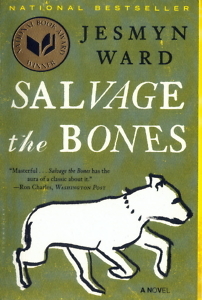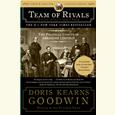Waiting for Katrina
Jesmyn Ward’s Salvage the Bones is the 2016 Memphis Reads selection
When Jesmyn Ward writes in Salvage the Bones about the cruelty of Hurricane Katrina or the terror of a pit-bull fight, she’s not relying solely on imagination. She and her family watched from a truck in a field as the Category Five storm devastated her area of coastal Mississippi in 2005. Her father and brother raised and sometimes fought pit bulls, and as a child she saved her own life by repeatedly punching one as it attacked her. “Narrative ruthlessness” is what she calls her gift for creating visceral fiction from her own experiences.

Ward’s novel, a 2011 National Book Award winner and the 2016 Memphis Reads selection, describes the days leading up to the deadly hurricane for a broken family living on the remote edge of a town called Bois Sauvage, Mississippi. It is also the story of the heroic stand the family makes against the traumatic thing itself.
With neglect that amounts to abuse, the drunken father in Salvage the Bones barely maintains a house for his children—three sons and a daughter—after his wife dies in the birth of the youngest. The girl, fifteen-year-old Esch, narrates the story, beginning with the grueling birth of puppies to her brother’s beloved pit bull, an event that conjures memories of her mother’s home delivery and death. Esch soon realizes that she is pregnant, and though she is miserably in love with the father of her child, he views her merely as a source of sexual relief.
Ward was born in Oakland, California, and earned degrees from Stanford and the University of Michigan, but she grew up in the tiny town of DeLisle, the inspiration for Bois Sauvage, or “savage wood,” where both Salvage the Bones and her previous novel, Where the Line Bleeds, are set. In her 2013 memoir, Men We Reaped, about the deaths of her brother and four other young men in her community, Ward wrote about DeLisle’s conflicting allure:
Homesickness had troubled me ever since I’d left for Stanford in 1995. I would hide weird crying jags from my then-boyfriend when I saw down-on-their-luck men who reminded me of my father. I would beg long conversations on the phone with my friends at home so I could listen to the sounds in the background, wishing I were there. I dreamed of the woods surrounding my mother’s house, that they were being razed and burned. I knew there was much to hate about home, the racism and inequality and poverty, which is why I’d left, yet I loved it.
In all of her books, Ward writes tenderly and knowingly about young men doomed to struggle against economic deprivation and intractable forms of racism in the rural South. Salvage the Bones is as much a story about a boy and his dog as it is about a girl and her pregnancy, or a family and Hurricane Katrina. The novel is animated by the affection and support the narrator gets from her siblings. And Esch is bewitched by her brother Skeetah’s love for his pit bull, China, a devotion that takes the two of them on a dangerous mission to steal medicine for the dog:
Skeetah grabs my hand, and I almost jump away from him, surprised at the feel of it around mine, his fingers hard, the small calluses on his palm from China’s leash now dry and scratchy as old bread. He pulls and we run through a corridor of pines, oaks, birch, birds. I can’t help it. I lean back against his pull, and I laugh. … Is this how Medea ran with her brother, hand in hand, away from their father’s hold to join the Argonauts?
 In both of Ward’s novels, mothers are absent, and fathers are addicts. Twin boys in Where the Line Bleeds lose their father to drugs. The four siblings in Salvage the Bones negotiate the precarious space around their angry, beer-bleary parent as he orders them to do what must be done to get ready for the storm that will become Katrina. “For a moment he looked not-drunk,” Esch says of her father as he talks about the hurricane.
In both of Ward’s novels, mothers are absent, and fathers are addicts. Twin boys in Where the Line Bleeds lose their father to drugs. The four siblings in Salvage the Bones negotiate the precarious space around their angry, beer-bleary parent as he orders them to do what must be done to get ready for the storm that will become Katrina. “For a moment he looked not-drunk,” Esch says of her father as he talks about the hurricane.
Ward, an associate professor of English at Tulane University, is also the editor of a new essay anthology called The Fire This Time: A New Generation Speaks About Race. Earlier this year she received a Strauss Living award for literary excellence—a $200,000 grant that will free her to write for two years. The revered short-story writer Joy Williams, an award juror, said in a statement: “Jesmyn Ward’s work, profoundly engaging and necessary, possesses great strength and a dire beauty.”
Ward has said she wrote a novel about Katrina in part because, “I was dissatisfied with the way it had receded from public consciousness.” According to Karen B. Golightly, director of Memphis Reads and an associate professor of English at Christian Brothers University, the choice of Salvage the Bones resonated with one CBU freshman from New Orleans: “You don’t understand, but we thought, eleven years later, everyone had forgotten about us.”

Peggy Burch was books editor at The Commercial Appeal in Memphis for ten years, and she also worked as a deputy metro editor and Arts & Entertainment editor for the newspaper. She is a graduate of the Newhouse School of Public Communications at Syracuse University and holds a master’s degree in English literature from the University of Mississippi.


